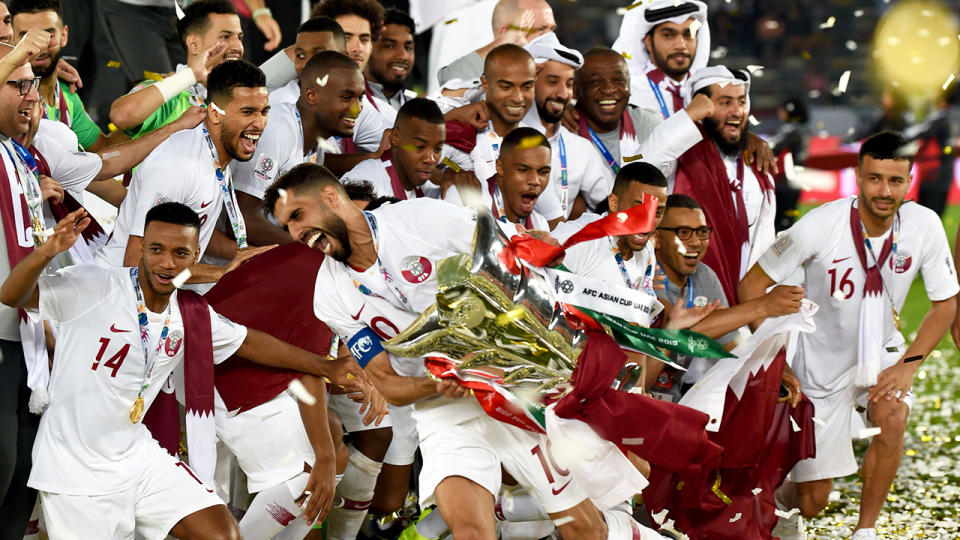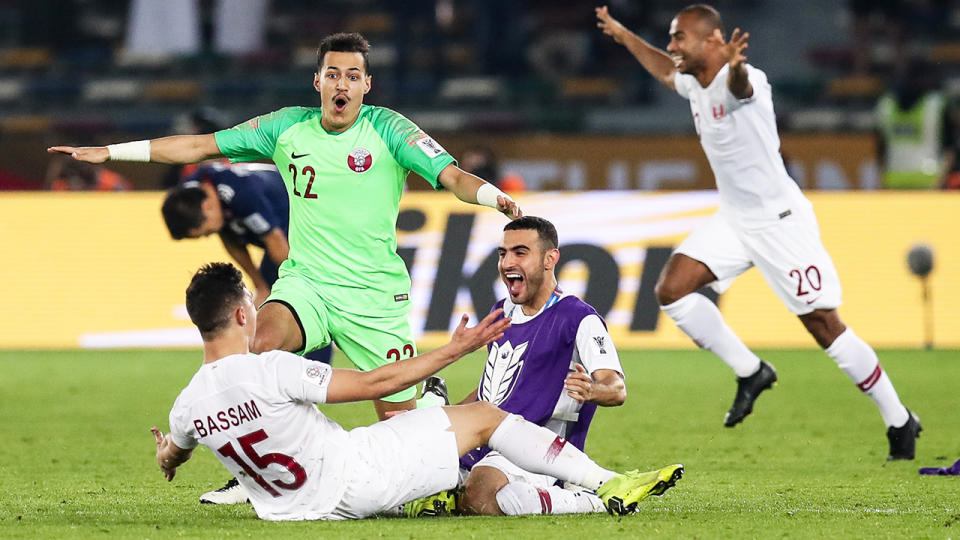Football world in shock over insane Asian Cup boilover
The glittering gold confetti that heralded Qatar’s Asian Cup win had hardly fallen back to earth before the next challenge was being discussed.
For most countries, winning a continental championship would spark days of celebrations and rewards aplenty for the gallant coach and heroes on the pitch.
But most countries are not Qatar, awarded a World Cup to host despite having never qualified for the event and with virtually no footballing history to speak of.
Coach Felix Sanchez and his players will, no doubt, indulge themselves – they have, after all, more than earned it by becoming winners of the Asian Cup with a 3-1 triumph over Japan in Abu Dhabi.
But then it will be back to work.
“This is one step more to continue developing the team, to play another tournament in the summer, and be ready for 2022, to be a competitive team at the World Cup,” said Sanchez.

It is less than four years to the next World Cup, and as hosts, Qatar do not need to qualify.
This, however, is a double-edged sword, with a lack of competitive games a problem after they play as guests in the Copa America this June.
“We are working on [the] target [of the] 2022 World Cup,” said striker Almoez Ali, who added the individual honours of top scorer with nine goals and most valuable player to his winners medal.
“We started now with the Asian Cup and managed to defeat Japan today. We’re preparing for it first with the Copa America in Brazil – we’re not expected to win that but just to learn in football.
“The weakest teams are in Asia – in the Copa America, we will learn more, we know the teams there have a different level. We will learn a lot there that will benefit us as a team.”

Qatar’s rush to be competitive following the World Cup award in 2010 was initially counterproductive. Coaches changed rapidly and there was little structure to the development of players.
The decision to promote Sanchez, a long-term youth coach in the country, to the senior team was inspired.
The Spaniard has known and worked with the majority of the squad for several years, many of them of since they were children.
Sanchez has continually stressed the team rather than the individual with everyone doing their job.

Qatar defeated Lebanon, North Korea, Saudi Arabia, Iraq, South Korea, the UAE and Japan to lift the trophy with a tournament record plus-18 goal difference. They were undeniably the best team but, as Ali said, Asia is weak – only Japan made it out of the group stage at the last World Cup.
South America is a different proposition and facing Colombia, Paraguay and Argentina will give a much better indicator of just how much work remains to be done for this Qatar side.
“[Their performance was] not a surprise for me, we knew Qatar can have a tight defence and strength in attack,” said beaten Japanese coach Hajime Moriyasu.
“They can move the ball and create chances, I think the head coach is building a great team for the World Cup.”
Qatar winning the final over Japan is insane. Xavi predicted right. Unbelievable. #AsianCup2019
— FLA (@fla02_) February 1, 2019
Insane overhead kick from Qatar, who are now champions of Asia. #JPNQAT https://t.co/WdJSyDYspb
— Gavin Lippman (@GLippy14) February 1, 2019
What an occasion not only watching but experiencing Qatar's first ever @afcasiancup title. Incredible scenes in the country tonight. Sheer joy and jubilation. #Qatar #asiancup2019 @QFA_EN pic.twitter.com/R5HmM7jaME
— Gareth Messenger (@G_Messenger) February 1, 2019
Incredible!
While we slept, Qatar took home the Asian Cup beating Japan 3-1.#OptusSport pic.twitter.com/ky8dROym8t
— Optus Sport (@OptusSport) February 1, 2019
Can't believe Qatar won it. Right in time to host a World Cup! Interesting to see what they do. That first goal was incredible. Rivaldo-esque. https://t.co/JQLiEim72L
— Sanjeev Mann (@Ask_Sanjeevs) February 1, 2019
Incredible! Qatar 🇶🇦 has won the #AsianCup2019 !!! 🏆
Without any doubt, football is the greatest sport in the world!! ⚽🌚🌏
Congratulations Qatar!!! 🙌 pic.twitter.com/XXDGvRKhm2
— Daniel 🌚 (@TheBohemianWolf) February 1, 2019